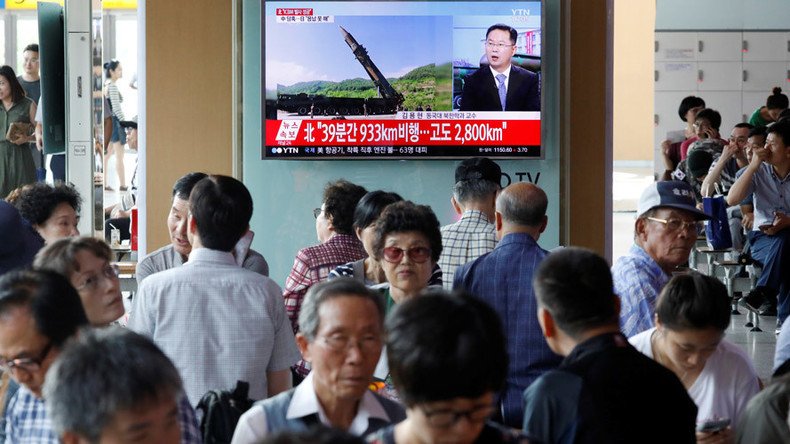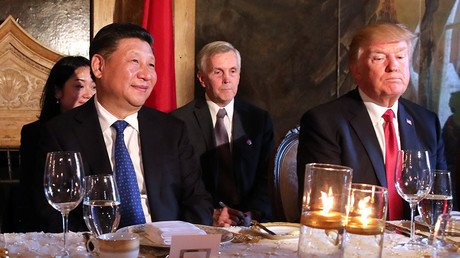‘It is up to US to avert catastrophe of 'declared war' on North Korea’

It is unprecedented at the UN that the president of the US threatened to murder 25 million people in the small country of North Korea; now it is up to the US to prevent a catastrophe, says Korea Peace Network member Dr. Simone Chun.
North Korea's Foreign Minister Ri Yong-ho claimed Donald Trump “declared war on Pyongyang” after making inflammatory comments on Twitter.
“Since the United States declared war on our country, we will have every right to take countermeasures, including the right to shoot down United States strategic bombers even when they are not inside the airspace border of our country,” he told reporters in New York on Monday.
READ MORE: ‘US declared war first’: N. Korea says it has right to shoot down strategic bombers
RT: Do you think North Korea genuinely believes President Trump has declared war on their country or is it some kind of a deliberate overstatement?
Dr. Simone Chun: This is the first time that a president of the US, the most powerful leader in the free world, declared a war and basically threatened to murder 25 million people in a small country such as North Korea. It is unprecedented, especially at the UN… When any leader or country is threatened, they have two options – to surrender or to resist. The North Korean response is standard and understandable: they said they are going to defend their country. There is nothing unusual. But I think the most important thing that we have to remember is that American public opinion, close to 70 percent, both Republicans and Democrats oppose any preemptive strike against North Korea. This is very strong condemnation and criticism of Donald Trump’s persistent threat to North Korea. We should really emphasize this. North Korea [gave] a standard and legitimate response.
RT: North Korea says their largest ever hydrogen bomb could be tested over the Pacific as a response to the US. Do you think that could actually happen?
SC: I don’t think it will happen if the US agreed or accepted the proposal that is on the table; the “double freeze” supported by China and Russia. I think there is still room for diplomatic solutions. I think North Korea will be willing to accept that…The US has been very… resistant to accept the proposal. Donald Trump, when he was running for president said he was willing to implement a new policy, he criticized Obama’s hard-line policy and even proposed “hamburger diplomacy” with North Korea. Tomorrow, if President Trump agrees and supports the proposal that China, Russia, and many other leaders support, I think we could avoid this catastrophic, disastrous outcome. It is up to the US to prevent and avert catastrophic consequences.
‘People try to move money away from risky assets in case of unfortunate escalation’
RT: How serious, do you think, is this latest statement from North Korea?
Craig Erlam: It just shows the tensions are escalating. We go a few days without hearing any comments on the issue. We hope that it is starting to fade away; we hope that tensions are starting to de-escalate. But inevitably we just keep getting fresh comments either from North Korea or from Donald Trump himself. We could see from the market’s reaction today that they are still far from immune to this commentary because of what it could potentially lead to. Thankfully, it hasn’t yet gone any further. So far, we have missile tests and military drills from the US and South Korea, for example. But fortunately, it hasn’t escalated any further. The concern today is the use of the rhetoric “declared war” is worrying people a lot. Hopefully, it will start to get defused. The problem is when you look at both sides, who is going to back down first in this war of words and I don’t see either side showing any willingness to do so.
RT: People seem to think this is just rhetoric at the moment. There is always a risk of miscalculation, isn’t there?
CE: Absolutely. And this is one of the things with the market. The markets are always going to respond carefully, but they are also going to respond early because if you got your money in the market, the longer it takes you to respond to the threat, the more money you stand to potentially lose. People do tend toward caution. That is what we’ve seen [hours after the announcement by North Korea]. We saw money moving away from the risky assets or pulling out of equities. Not on a huge level but on a minor level, moving into typically safe haven assets... Again, people are just moving their money toward safety because if anything does unfortunately and surprisingly escalate, then you would expect to see these safer haven assets, such as gold, benefit in the short term.














